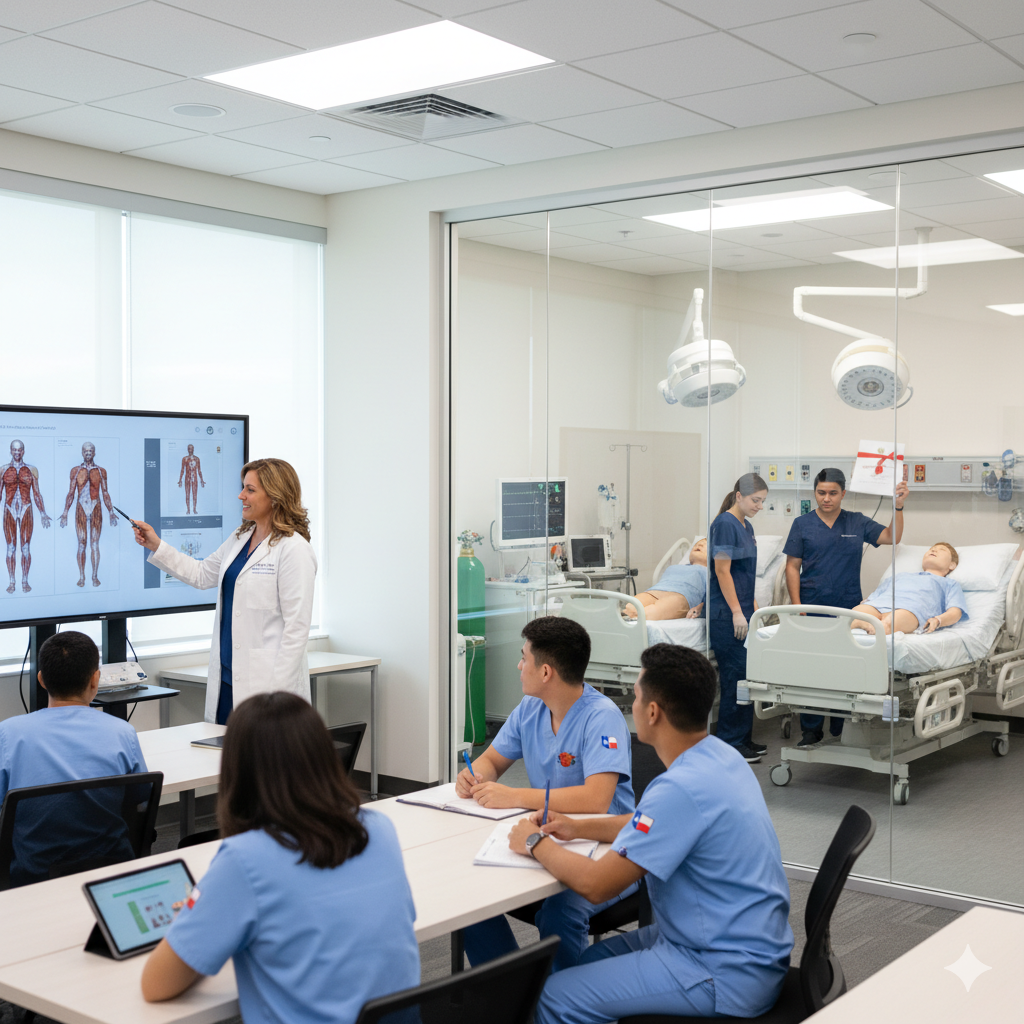The healthcare industry in Texas is booming, with hospitals, clinics, nursing homes, and specialized care centers constantly seeking qualified professionals. Whether you want to become a nurse, medical assistant, patient care technician, or earn certifications like BLS, ACLS, CPR, or NCLEX prep, the right training program can set the foundation for your career success. But with so many schools and training centers across the state, how do you decide which one is right for you?
This guide walks you through key factors to consider when choosing a healthcare training program in Texas, ensuring you make an informed decision that supports your career goals.
1. Define Your Career Goals
Before enrolling, clarify what you want to achieve.
-
Do you want a short-term certification (like BLS or CPR) to boost employability?
-
Are you preparing for major licensing exams such as the NCLEX in Texas?
-
Or are you looking for long-term career opportunities as a Patient Care Technician (PCT) or in nursing support roles?
Your goals determine whether you should choose a vocational program, community college, or a specialized healthcare academy.
2. Check Accreditation and Recognition
Accreditation matters. A program accredited by recognized healthcare or education boards ensures the training meets industry standards.
-
In Texas, look for programs approved by organizations like the Texas Higher Education Coordinating Board (THECB) or recognized national accrediting bodies.
-
For certifications like CPR, BLS, or ACLS, ensure the training is American Heart Association (AHA)-approved.
Employers trust accredited programs, making your certification more valuable.
3. Consider Location and Flexibility
Texas is vast, so location is an important factor. Choose a school that is:
-
Conveniently located near your home or workplace.
-
Offers flexible schedules—evening, weekend, or hybrid online options.
For example, if you’re in Houston, Dallas, or San Antonio, you’ll find many healthcare training centers offering both in-person and online learning.
4. Review Course Offerings and Specializations
Not all training centers offer the same programs. Compare the curriculum and see which aligns with your career path:
-
Basic Life Support (BLS) – Ideal for nurses, medical students, and first responders.
-
Advanced Cardiovascular Life Support (ACLS) – For professionals working in emergency or critical care.
-
CPR & First Aid – Essential for caregivers, teachers, and community professionals.
-
Patient Care Technician (PCT) – Comprehensive training for hospital and clinic settings.
-
NCLEX Prep Courses – Focused coaching for nursing students aiming to pass the Texas licensure exam.
5. Look at Instructor Expertise
The quality of instructors can make or break your learning experience. Experienced trainers bring real-world knowledge, practical tips, and confidence to the classroom. When researching a program, ask:
-
Do instructors have relevant certifications and industry experience?
-
Are they approachable and supportive during hands-on training?
-
Do past students mention them positively in reviews?
6. Hands-On Training and Facilities
Healthcare is a hands-on field, and your training program should reflect that. Look for programs that include:
-
Simulation labs with updated equipment.
-
Opportunities for clinical rotations or externships in Texas healthcare facilities.
-
Practical demonstrations alongside classroom instruction.
Hands-on training helps you transition smoothly into real-world healthcare environments.
7. Class Size and Student Support
Smaller class sizes mean more personalized attention. Beyond that, check if the school provides:
-
Tutoring or extra practice sessions.
-
Career counseling and job placement assistance.
-
Networking opportunities with healthcare professionals in Texas.
Strong student support can make your journey smoother and increase your job prospects.
8. Compare Tuition Costs and Financial Aid
Cost is an important consideration, but don’t let it be the only one. While affordable tuition is important, focus on value for money—the quality of training you receive compared to the price.
-
Ask about scholarships, installment plans, or employer reimbursement programs.
-
Some Texas healthcare academies offer financial aid support or discounts for bundled certifications (like combining BLS + ACLS + CPR).
9. Check Student Reviews and Success Rates
Before committing, read student testimonials and success stories. Look for details about:
-
The program’s pass rates for certification exams like the NCLEX.
-
Graduate employment rates in Texas healthcare facilities.
-
Overall satisfaction with the instructors, learning environment, and hands-on training.
Real student experiences give insight into what you can expect.
10. Evaluate Career Support and Placement Services
The best healthcare training programs don’t stop at education—they help launch your career. Ask about:
-
Resume-building workshops.
-
Job placement assistance in Texas hospitals, clinics, or home healthcare agencies.
-
Partnerships with local employers who often recruit directly from the program.
Final Thoughts
Choosing the right healthcare training program in Texas is a decision that can shape your entire career. Focus on your goals, ensure accreditation, prioritize hands-on training, and evaluate instructor quality and student support. With the right program, you’ll not only earn a certification but also gain the confidence and skills to thrive in Texas’s dynamic healthcare industry.
If you’re ready to take the next step, explore reputable healthcare training academies near you, compare programs, and start building your future today.




